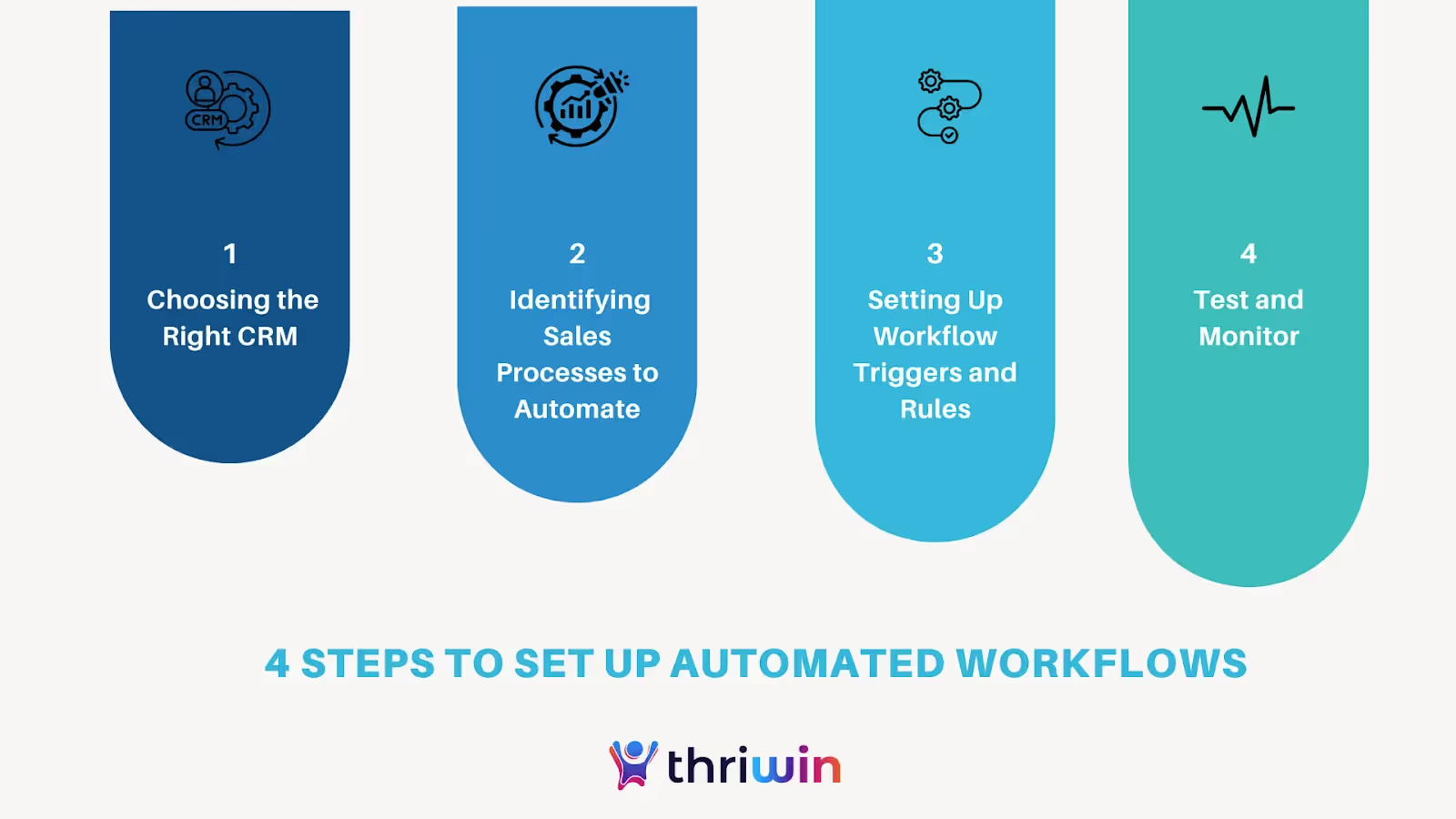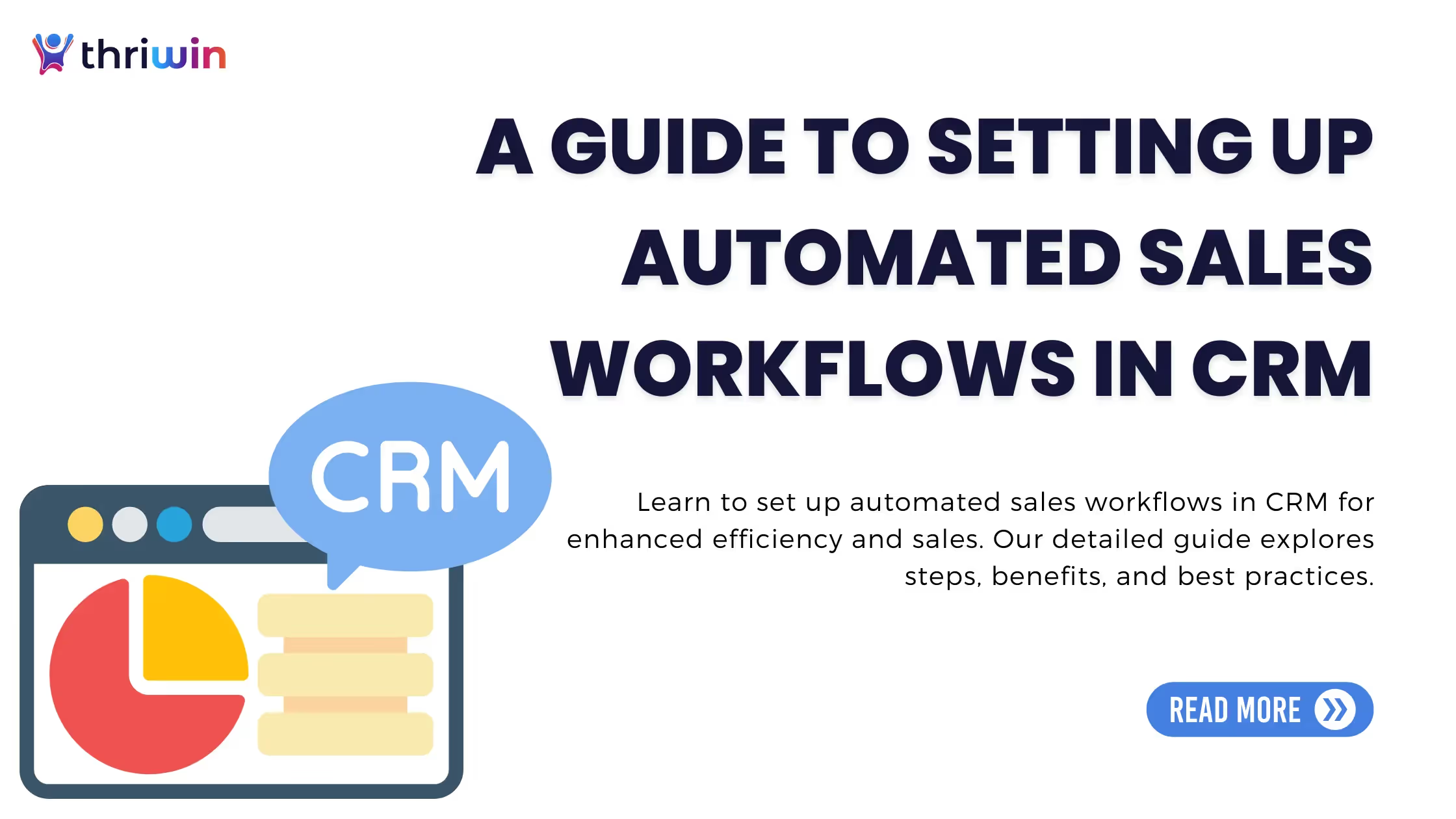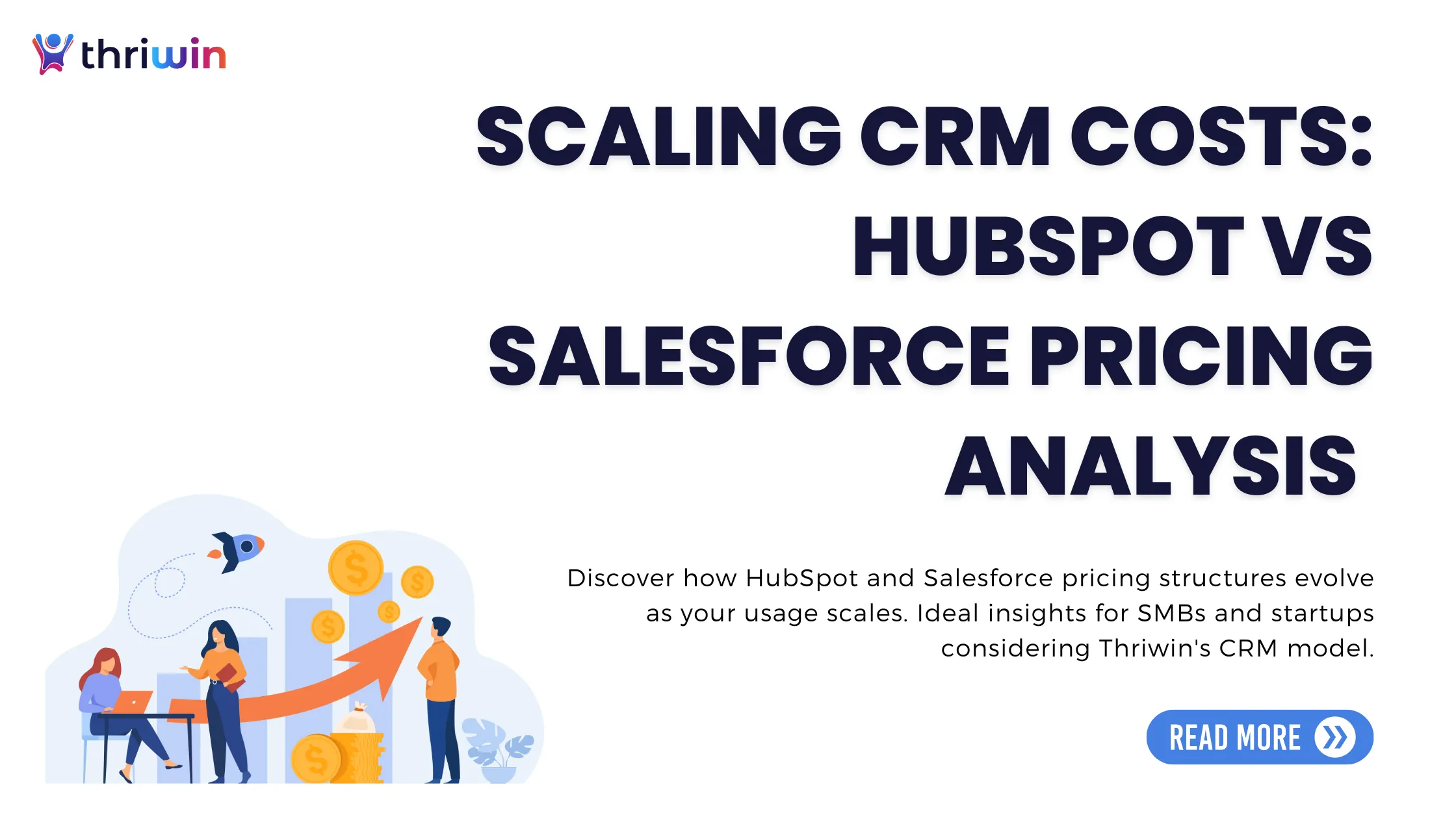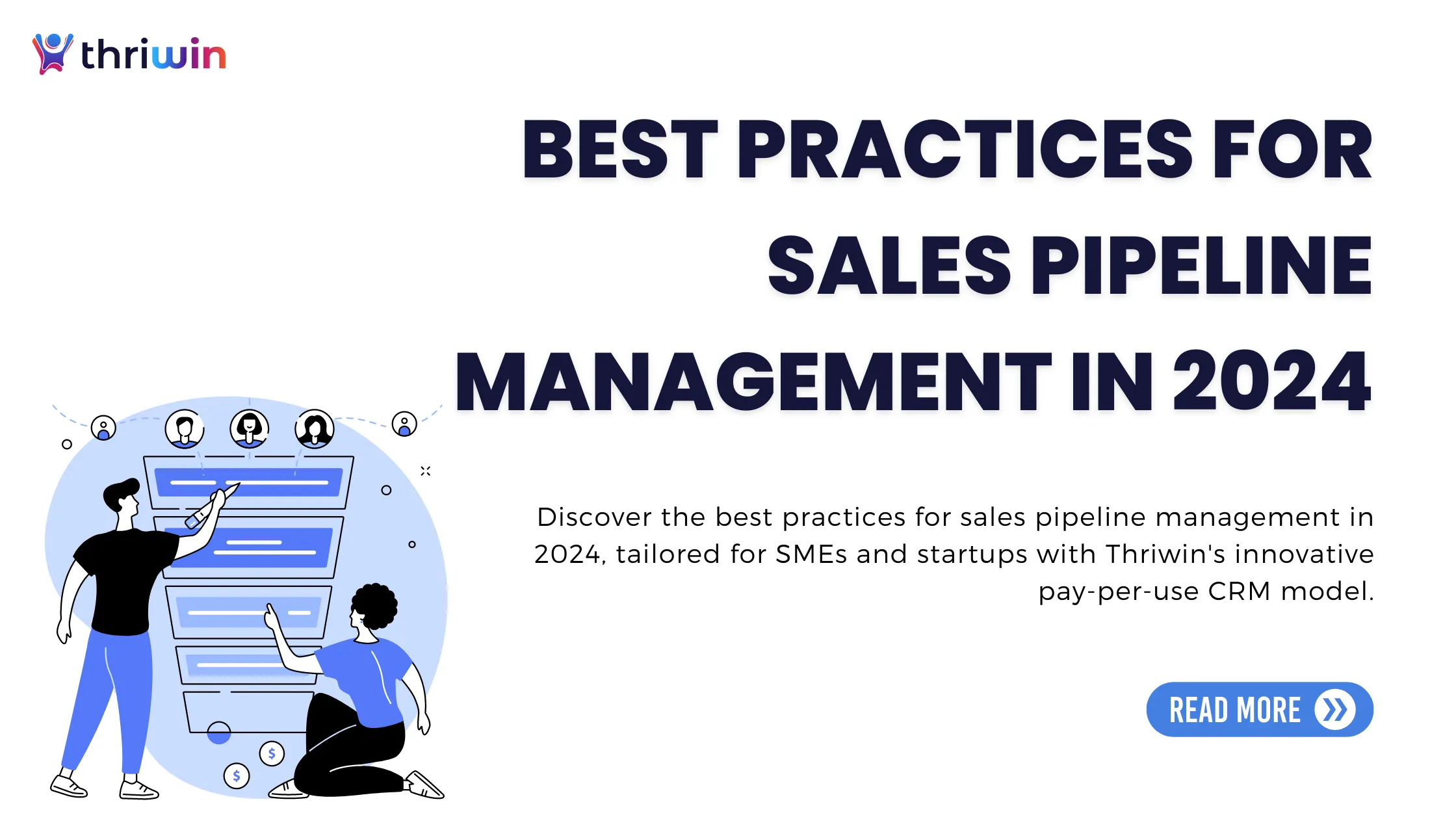Automating sales workflows in a CRM helps streamline tasks, improve efficiency, and boost sales performance. This guide will walk you through the steps to set up automated workflows, covering key processes, best practices, and the benefits of CRM automation. Learn how to set up triggers, automate follow-ups, and enhance your sales team's productivity with simple, effective automation techniques.
What is Sales Workflow Automation?
Sales workflow automation is using CRM tools to carry out routine sales tasks automatically. It removes the need for manual involvement in repetitive actions like sending follow-up emails, assigning leads, and updating customer information. Instead, the CRM executes these tasks based on specific triggers, such as when a new lead is added or a prospect reaches a particular stage in the sales pipeline.
Automation works by setting predefined rules in the CRM. For example, when a lead fills out a contact form, the system can automatically send a welcome email and assign the lead to a sales rep. Similarly, it can remind the team to follow up with clients at the right time.
By implementing sales workflow automation, businesses can ensure that their sales processes run smoothly, allowing teams to focus on engaging with prospects and closing deals rather than handling routine admin tasks.
Benefits of Sales Workflow Automation
Sales workflow automation offers a wide range of advantages for businesses, helping streamline operations and enhance productivity:
Improved Lead Management:
Automation ensures that leads are tracked throughout the sales funnel, with timely follow-ups and communication. This helps prevent any potential leads from slipping through the cracks, ensuring no opportunity is missed.
Reduced Manual Tasks:
By automating repetitive tasks like sending follow-up emails, updating CRM records, and assigning leads to team members, sales teams can focus more on meaningful work like nurturing relationships and closing deals rather than getting bogged down in administrative tasks.
Faster Sales Cycle:
With automation handling tasks like lead qualification, follow-up reminders, and pipeline updates, the sales process moves much faster. This reduces delays and helps close deals quicker, improving overall sales performance.
Better Accuracy:
Automated workflows minimize the chances of human error, ensuring that data is entered correctly, follow-ups happen on time, and no tasks are overlooked. This improves the overall reliability of the sales process.
Enhanced Customer Experience:
Through automated workflows, customers receive consistent and timely responses. Whether it’s an immediate follow-up email after an inquiry or scheduled check-ins during the sales process, automation ensures smooth and professional communication, which improves the customer experience.
Consistency in Sales Processes:
Automation standardizes processes across your sales team, ensuring that every lead is handled in the same way regardless of who is managing it. This consistency ensures a uniform customer experience and prevents any deviations that could affect the sales cycle.
Better Data Management:
Sales workflow automation allows for better organization and management of sales data. With automatic updates to CRM records, businesses can ensure that data remains accurate and up to date, helping sales teams make informed decisions and enabling better forecasting.
By automating sales workflows, businesses can enhance the efficiency of their operations, improve sales performance, and provide a better experience for both customers and sales teams.
How to Set Up Automated Workflows in Your CRM
Setting up automated workflows in your CRM is one of the most efficient ways to streamline your sales process. Automation helps eliminate manual tasks, improve lead management, and ensure a seamless customer journey. Here’s a detailed guide on how to set up automated workflows in your CRM.

1. Choosing the Right CRM
Choosing the right CRM for your business is a critical first step in setting up automated workflows. With many CRM systems offering different features, it’s essential to evaluate your unique business needs before making a decision. Here’s what to consider:
- Sales Process Alignment: Look for a CRM that aligns with your current sales motion. If your business focuses on inbound marketing, you might need tools that support lead generation and nurturing. For companies focused on scaling, you’ll need a CRM that supports complex workflows and multiple sales channels.
- Automation Features: Evaluate whether the CRM offers the level of automation you need, such as task automation, email workflows, lead scoring, and pipeline management. Ensure the CRM can automate the specific processes that are the most time-consuming for your team.
- Customization and Scalability: As your business grows, your CRM needs will evolve. Choose a CRM that provides customization options for workflows, integrations, and reporting. Also, consider whether the CRM can scale with your business without requiring expensive upgrades.
- Cost and Pricing Model: While many CRMs offer free or low-cost entry plans, be mindful of how the costs scale with usage. For example, a pay-per-use model might be more economical for fast-growing companies. It is essential to do a cost-benefit analysis of the CRMs to ensure your picking the one best suited for your business.
- Support and Onboarding: Opt for a CRM that provides strong onboarding and ongoing support. Some CRMs offer comprehensive onboarding services, including workflow setup and customization, which can help you start automating quickly and without friction.
2. Identifying Sales Processes to Automate
The next step is to identify which parts of your sales process can benefit most from automation. Not all tasks require automation, so it’s important to focus on repetitive and time-consuming activities that can improve sales efficiency. Key sales tasks to automate include:
- Follow-Up Emails: Automating follow-up emails ensures that your prospects are nurtured at every stage of the sales cycle without your team having to manually track or send emails. For example, after a prospect downloads a resource or fills out a form, a workflow can trigger personalized follow-up emails.
- Lead Nurturing: Use automation to nurture leads based on where they are in the sales funnel. Trigger workflows to send relevant content at each stage—whether it’s educational material for early-stage leads or product demos for those further down the pipeline.
- Task Assignments: Automating lead assignments ensures that the right salesperson follows up with leads based on predefined criteria like geography, industry, or interest. This reduces the chance of leads slipping through the cracks.
- Pipeline Updates: Automate pipeline management by moving prospects through the sales funnel based on their interactions, such as email engagement or meeting attendance. This keeps your pipeline organized and ensures timely follow-ups.
By automating these sales processes, your team can focus more on closing deals rather than handling routine tasks.
3. Setting Up Workflow Triggers and Rules
Once you’ve selected your CRM and identified the tasks you want to automate, the next step is to set up triggers and rules. These are the specific conditions that start the automation process. Here’s how you can configure them:
- Choose Your Trigger: The trigger is the event that initiates a workflow. For example, a trigger could be when a lead submits a form on your website or reaches a specific stage in the pipeline. In HubSpot, a trigger might be an email open or a lead filling out a form. In Thriwin.io, triggers can be more complex, such as when a lead interacts across multiple channels like email, calls, and landing pages.
- Define Actions: Once the trigger is set, define the actions the CRM should perform. For example, if a new lead enters the system, the workflow might automatically assign it to a sales rep, send a follow-up email, and create a reminder for a call. These actions can vary in complexity depending on the CRM you use. Thriwin.io allows for multi-step actions across different sales channels, which is particularly helpful for fast-growing companies.
- Set Conditions: Conditions help tailor workflows based on specific criteria. For instance, you might only want to assign leads that meet a certain score or geographic region. Adding conditions ensures that workflows are relevant and only apply when appropriate.
- Test and Optimize: Before going live, it’s essential to test your workflows to ensure they work correctly. Check if the trigger initiates the right actions and if the conditions are correctly applied. Monitor the workflow’s performance and optimize based on results.
By carefully setting up triggers and rules, you can automate repetitive tasks and ensure that your sales process runs smoothly without manual intervention.
4. Test and Monitor
After setting up your automated workflows, testing them thoroughly is essential. Run through different scenarios to see how the workflow performs in real time. Monitor key metrics like:
- Lead response time: How quickly does the CRM respond to new leads?
- Task completion: Are assigned tasks being completed on time?
- Workflow performance: Are the triggers firing correctly, and are the actions being executed as expected?
Testing ensures that your automation runs smoothly and delivers the intended results. Review your workflows regularly and optimize them to improve efficiency and adapt to changing sales goals.
CRM Features for Workflow Automation
Automating your sales tasks requires a CRM with workflow automation capabilities to streamline various parts of your sales process. From managing customer interactions to handling internal tasks, these features ensure a smooth and efficient operation. Here are some of the key features that help automate sales workflows:
Email Automation
Email automation allows your CRM to send personalized emails based on specific triggers, such as form submissions, email opens, or other interactions. For instance, you can automatically send follow-up emails to leads or reminders to customers. This feature ensures consistent and timely communication without manual intervention, helping nurture leads effectively.
Lead Scoring
Lead scoring helps you prioritize leads based on their level of engagement, behavior, or other qualifying factors. A CRM with lead scoring automation can assign scores to leads based on actions they take, like website visits or email clicks. Sales reps can then focus on high-potential leads, improving conversion rates.
Task Reminders and Assignment
Task automation allows your CRM to assign and remind sales reps of important tasks, such as follow-ups or calls. Reminders can be triggered by specific actions, ensuring that no lead or task is overlooked. This feature keeps your sales team organized and on top of their responsibilities.
Pipeline Management
Automated pipeline management helps move leads through the sales funnel automatically. Based on actions like scheduling a demo or completing a form, the CRM can shift leads from one stage to another, ensuring that the sales process flows smoothly and that prospects are managed efficiently.
Workflow Analytics and Reporting
A CRM with workflow automation often includes analytics and reporting features that allow you to monitor the performance of your automated workflows. You can track metrics like email open rates, conversion rates, and lead response times, helping you optimize your automation strategies over time.
Integration with Other Tools
Many CRMs integrate with other sales and marketing tools, allowing you to extend automation across different platforms. For example, integrating with email marketing tools, social media platforms, or e-commerce systems ensures that your workflows are seamless across all touchpoints.
Best Practices for Automating Sales Workflows
Automating your sales workflows can greatly enhance efficiency and productivity, but it’s important to follow best practices to ensure successful implementation. Below are some key strategies to optimize your automation efforts and avoid common pitfalls.
Personalizing Automated Interactions
Even though workflows are automated, personalization should never be sacrificed. Use dynamic fields in your CRM to personalize emails, addressing prospects by name and tailoring the content based on their behavior or interests. For example, customize email sequences based on a lead’s activity, such as their recent downloads or interactions with your website. This keeps the engagement meaningful and relevant, even though the process is automated.
Monitoring and Optimizing Automated Workflows
Once workflows are set up, it’s crucial to monitor their performance through key performance indicators (KPIs) such as open rates, conversion rates, and lead response times. Regularly review these metrics to identify areas where automation may be underperforming or causing bottlenecks. Make adjustments to optimize the efficiency and effectiveness of your workflows, ensuring they continue to deliver the desired results over time.
Regularly Reviewing and Updating Workflows
Sales processes change, and so should your workflows. Regularly review your automation to ensure it still aligns with your current sales goals and strategies. Update triggers, actions, and conditions to adapt to new business priorities, market changes, or shifts in customer behavior. This keeps your automation relevant and responsive to evolving sales conditions.
Ensuring Data Accuracy
For automation to be effective, the data feeding into the workflows must be accurate. Incomplete or outdated data can cause workflows to misfire or result in impersonal interactions. Regularly clean your CRM data to ensure customer information, lead statuses, and sales pipeline stages are up to date. This ensures your workflows are based on reliable information and lead to more effective outcomes.
Avoiding Over-Automation
While automation is powerful, over-reliance on it can lead to a lack of personal touch in your sales process. Avoid automating every interaction—ensure that key points in the customer journey, such as high-stakes negotiations or closing deals, are handled by your sales team. Balance automation with human involvement to maintain a strong relationship with your prospects.
Setting Clear Workflow Goals
Before implementing any workflow, ensure that you have clear goals. Are you trying to improve lead response times? Or perhaps shorten the sales cycle? Establishing clear objectives allows you to design workflows that directly target those goals and ensures that automation contributes to measurable improvements in your sales performance.
Key Metrics to Track Automation Success
Tracking the right Key Performance Indicators (KPIs) is crucial for measuring the success of your automated sales workflows. These metrics will help you understand how well your automation performs and where you can improve. Below are some of the most important KPIs to monitor when evaluating the effectiveness of your automated workflows.

Lead Response Time
Lead response time is the time it takes for your team to follow up with a lead after they’ve engaged with your business, such as filling out a form or contacting your team. Automation can drastically reduce this time by triggering immediate follow-ups without waiting for manual input.
Monitoring lead response time is essential because faster responses often lead to higher conversion rates. If your automated workflow is functioning correctly, this time should be minimal. A shorter lead response time reflects your company’s ability to engage prospects quickly and efficiently.
Formula to calculate Lead Response Time:
(Total time to respond to leads) / (Number of leads) = Average Lead Response Time
Example:
If your sales team responded to 5 leads, with response times of 10 minutes, 15 minutes, 20 minutes, 12 minutes, and 18 minutes, the total response time would be 75 minutes. Dividing this by 5 (the number of leads) gives an average lead response time of 15 minutes.
Conversion Rate
The conversion rate measures how many of your leads are moving forward in the sales funnel, such as turning from a prospect into a qualified lead or from a lead into a customer. Automation can help by ensuring timely follow-ups and sending targeted messages at the right stages, improving the chances of conversion.
Tracking conversion rates allows you to see how effectively your workflows push leads further through the funnel. If your workflows are doing their job, you should see an improvement in this metric over time.
Formula to calculate Conversion Rate:
(Number of leads that convert to the next stage) / (Total number of leads) = Conversion Rate
- Example:
If 20 leads entered your sales funnel, and 5 of them converted into customers, your conversion rate would be 5/20 = 0.25 or 25%.
Task Completion Rate
Automated workflows often involve assigning tasks to sales reps, such as follow-ups, calls, or meetings. The task completion rate shows how effective your team is at completing these tasks on time. A high task completion rate indicates that your workflows are functioning smoothly and your team is keeping up with the pace of automation.
You should monitor this metric closely, as it can reveal bottlenecks in your process. If tasks are not being completed, it could indicate that the automation is creating too many tasks, or that sales reps need more time to handle their workload.
Formula to calculate Task Completion Rate:
(Number of completed tasks) / (Total assigned tasks) = Task Completion Rate
Sales Cycle Length
Sales cycle length refers to the time it takes for a lead to progress through the sales funnel, from the initial interaction to closing a deal. One of the primary goals of automation is to shorten this cycle by ensuring quicker responses and follow-ups.
Tracking your sales cycle length will allow you to determine if your automated workflows are speeding up the process. Reducing the sales cycle length indicates that your automation works effectively, keeping leads through the pipeline efficiently.
Formula to calculate Sales Cycle Length:
(Sum of time spent on each deal) / (Number of closed deals) = Average Sales Cycle Length
Example:
If 50 tasks were assigned to your team and 45 were completed on time, your task completion rate would be 45/50 = 0.9, or 90%.
Pipeline Velocity
Pipeline velocity measures how quickly leads move through your sales pipeline. Automated workflows should help move leads from one stage to the next by triggering specific actions at each point. Pipeline velocity is a good indicator of how well your automation performs, as faster velocity typically means your automation is efficiently pushing leads through the funnel.
To calculate pipeline velocity, consider the number of qualified leads, the average deal size, and your conversion rates. This will show you how quickly and effectively your leads convert to sales.
Formula to calculate Pipeline Velocity:
(Number of qualified leads) x (Conversion Rate) x (Average Deal Size) / (Length of Sales Cycle) = Pipeline Velocity
Example:
If you have 10 qualified leads, a conversion rate of 20%, an average deal size of $5,000, and an average sales cycle length of 30 days, your pipeline velocity would be (10 x 0.2 x 5000) / 30 = $3,333 per day.
Return on Investment (ROI)
Return on Investment (ROI) is the ultimate metric to track when evaluating the success of your automated workflows. It tells you whether the time, effort, and resources spent on setting up and maintaining automation generate more revenue than the cost of implementation.
Calculating ROI helps you measure the overall profitability of your automation strategy. It’s beneficial for determining whether investing in CRM tools, automation features, and workflow optimization is worth the cost of increased sales and productivity.
Formula to calculate ROI:
(Total Revenue from Automation - Total Costs) / (Total Costs) = ROI
Example:
If the total revenue generated from automation is $50,000 and the total costs associated with the automation implementation are $10,000, the ROI would be (50,000 - 10,000) / 10,000 = 4, or 400% ROI.
By monitoring these key metrics, you can see how well your automated workflows are performing and where improvements can be made. Tracking these KPIs ensures that your automation strategy is efficient and effective in driving business growth.
Start Automating Your Sales Workflows Today
Automating your sales workflows can greatly enhance your team’s productivity and collaboration, reduce manual tasks, and improve lead management. With the right CRM and best practices, automation streamlines your sales process, shortens the sales cycle, and boosts conversion rates. Whether you're looking to improve lead follow-ups or optimize task management, automation can drive significant growth.
For companies focused on aggressive growth, Thriwin offers a perfect solution. With pay-per-use pricing, free onboarding support, and customization tailored to your business, Thriwin.io helps you activate sales channels in just days and start growing revenue quickly. Don't wait—start automating your sales workflows today with Thriwin, and unlock your team’s full potential!
%201.svg)






